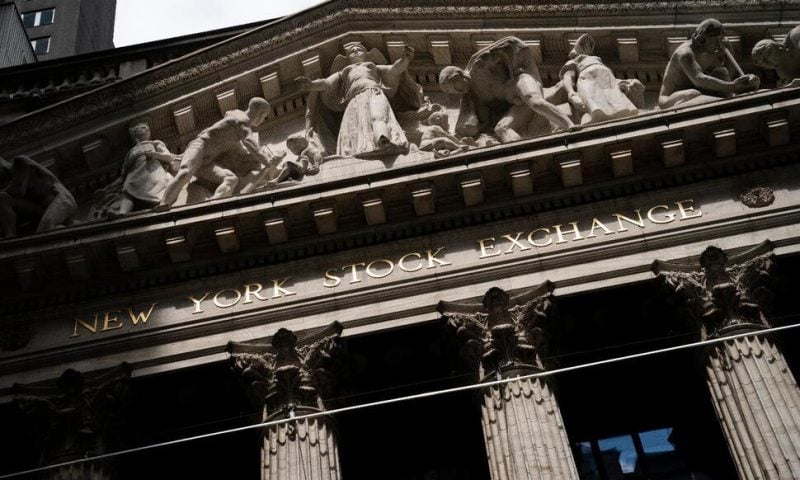Wall Street gave back some of its strong gains from the week on Friday following discouraging readings on the global economy and another slew of profit reports from big U.S. companies.
NEW YORK — Stocks slipped Friday, giving back some of their gains from earlier in the week as worries brewed about the global economy and prospects for profits at big internet companies.
The S&P 500 lost 0.9% to break a three-day rally that had carried Wall Street to its highest level in six weeks. The Nasdaq composite led the market lower with a 1.9% drop following worse-than-expected profit reports from Snap, Seagate Technology and other tech-oriented companies.
The Dow Jones Industrial Average held up better, slipping a more modest 0.4%. That was in large part because constituent American Express gave an encouraging earnings report and said its cardholders were spending more.
Sandwiched between last week’s dispiriting report on inflation and next week’s decision by the Federal Reserve on interest rates, the S&P 500 still delivered its best week in a month following a collection of mostly better-than-expected reports on corporate profits. Falling yields in the bond market also helped, easing the pressure on stocks after expectations for rate hikes by the Fed sent yields soaring much of this year.
On Friday the two-year Treasury yield tumbled again, to 2.98% from 3.09% late Thursday and from 3.14% a week ago, on worries about the economy. A report Friday morning indicated U.S. business activity may be shrinking for the first time in nearly two years, with service industries particularly weak.
“Manufacturing has stalled and the service sector’s rebound from the pandemic has gone into reverse, as the tailwind of pent-up demand has been overcome by the rising cost of living, higher interest rates and growing gloom about the economic outlook,” Chris Williamson, chief business economist at S&P Global Market Intelligence said in a statement accompanying the survey data.
Similar reports earlier in the morning also suggested weakness in Europe, underscoring how fragile the global economy is as central banks jack up interest rates in order to whip inflation. Higher rates make economic conditions more difficult, and too-aggressive hikes could cause a recession.
Friday’s reports are the latest to show parts of the economy are slowing more than expected. While that raises the threat of a recession, it also has traders ratcheting back expectations for the Federal Reserve’s aggressiveness next week. Instead of a full percentage point, traders now see an increase in rates of 0.75 percentage point as the most likely outcome.
The 10-year Treasury yield fell to 2.76% from 2.91% late Thursday.
In the stock market, the company behind the Snapchat app tumbled 39.1% after it reported a worse loss and lower revenue for the spring than Wall Street forecast.
The weakness for Snap could mean pressure on other companies that depend on internet advertising, which also happen to be among Wall Street’s most influential stocks. The parent companies of both Facebook and Google are scheduled to report their earnings next week. The pair fell 7.6% and 5.6% respectively on Friday, accounting for two of the heaviest weights on the S&P 500.
The S&P 500 lost 37.32 points to close at 3,961.63. The Dow fell 137.61 to 31,899.29, and the Nasdaq fell 225.50 to 11,834.11.
Adding to the pain for tech, data storage company Seagate Technology lost 8.1%. It said anti-COVID measures in Asia and slowing global economic conditions last quarter hit its results, which fell short of forecasts.
Verizon dropped 6.7% after its profit fell short of expectations, though its revenue squeaked past. It also cut its forecast for earnings this year.
On the winning side was American Express, which rose 1.9% after it delivered better profit for the spring than analysts expected. It said customers spent more on travel and entertainment in April than they did before the pandemic, the first time that’s happened.
The encouraging data bolstered some recent comments from CEOs at big banks, who said their customers appear to be in solid financial shape despite all the worries about inflation and the economy.
Despite Friday’s drops for Wall Street, the S&P 500 still rose 2.5% for the week.
Besides the easing of Treasury yields through the week, dropping prices for crude oil and other commodities also provided some relief on the inflation front. They add to some signals suggesting inflation may be close to peaking, such as easing expectations for inflation in future years, said Nate Thooft, senior portfolio manager at Manulife Investment Management.
“Inflation is the most important thing,” he said. “It’s not earnings, it’s not the Fed, it’s not interest rates themselves. It’s the uncertainty of inflation.”
“To me, as soon as you see real evidence that inflation is stabilizing and improving, all the other things also become less problematic,” he said. The war in “Ukraine is separate and off in the corner, but all the others are related, and the epicenter is inflation.”

